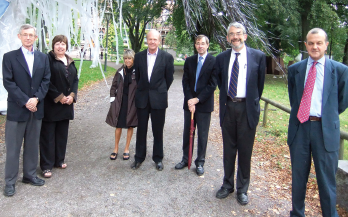 On Feb. 1, the Royal Swedish Academy of Sciences announced that Daniel L. Kastner, MD, PhD, scientific director of the Division of Intramural Research of the National Human Genome Research Institute, where he is a National Institutes of Health (NIH) Distinguished Investigator, was awarded the 2021 Crafoord Prize in Polyarthritis “for having established the concept of autoinflammatory diseases.” The award, which comes with a prize of 6 million Swedish kronor, will—by tradition—be presented by the King of Sweden at a ceremony later this year (postponed until November due to the pandemic).
On Feb. 1, the Royal Swedish Academy of Sciences announced that Daniel L. Kastner, MD, PhD, scientific director of the Division of Intramural Research of the National Human Genome Research Institute, where he is a National Institutes of Health (NIH) Distinguished Investigator, was awarded the 2021 Crafoord Prize in Polyarthritis “for having established the concept of autoinflammatory diseases.” The award, which comes with a prize of 6 million Swedish kronor, will—by tradition—be presented by the King of Sweden at a ceremony later this year (postponed until November due to the pandemic).
Dr. Kastner, who obtained a Bachelor of Arts (A.B.) in philosophy summa cum laude from Princeton University in 1973 and an MD and a PhD from Baylor College of Medicine in 1982, has worked at the NIH since 1985.
As a rheumatology fellow during his first year at the NIH, Dr. Kastner encountered a patient with recurrent attacks of fever and arthritis and the unusual diagnosis of familial Mediterranean fever (FMF). It is proof of Dr. Kastner’s truly scientific mind that caring for this one patient triggered fundamental bed-to-bench research: The search to understand the cause of FMF started his distinguished career in science.
Dr. Kastner established a research group at the National Institute of Arthritis and Musculoskeletal and Skin Diseases (NIAMS) and, in 1992, mapped the abnormal gene to chromosome 16p. It took another five years and an international collaboration to identify the abnormal gene causing FMF using the cumbersome positional cloning technique. The gene encodes the protein pyrin and triggers inflammation.
That breakthrough was soon followed by the identification of patients with rare, early onset, familial inflammatory conditions with mutations affecting the p55 tumor necrosis factor (TNF) receptor, giving rise to a dominant inherited condition called TNF receptor-associated periodic syndrome (TRAPS). This results in abnormal TNF signaling; treatment with TNF inhibitors may dramatically improve the condition. By identifying the cause of TRAPS, Dr. Kastner established the concept of autoinflammatory diseases.

Speakers at the 2011 Cutting Edge Rheumatology meeting in Lund, from left: Bruce and Sally Richardson, Ann Arbor, Mich.; David and Sue Eyre, Seattle; Thomas Krieg, Cologne, Germany; Dan Kastner, NIH; John Isaacs, Newcastle, U.K.
Another of Dr. Kastner’s breakthroughs was the discovery of mutations in the gene located in chromosome 1q44 coding for NLPR3, , a protein with structural similarities to pyrin functioning as a pattern recognition receptor that leads to uncontrolled inflammation through overactivation of caspase-1. This results in a group of conditions, known as cryopyrin-associated periodic syndromes (CAPS), caused by overactive NLPR3 inflammasome. These conditions can be controlled by interleukin-1 inhibition.
Dr. Kastner’s group has identified the genes underlying no fewer than 16 inherited conditions.
In 2011, he was one of the guest speakers at the annual Cutting Edge Rheumatology symposium in Lund, Sweden, for Scandinavian rheumatologists. Dr. Kastner delivered a brilliant talk titled Horror Autoinflammaticus: The Expanding Spectrum of Systemic Autoinflammatory Diseases, in which he, for the first time, presented a new condition, PLCG2-associated antibody deficiency and immune dysregulation syndrome (PLAID), thrilling the audience with this news. Dr. Kastner had recently relocated his research group from NIAMS to the Division of Intramural Research of the National Human Genome Research Institute at the NIH and just discovered his 13th disease.
An important lesson from Dr. Kastner’s work is that the elucidation of pathogenic mechanisms of rare conditions can impact the understanding of common diseases with complex pathogenesis. Dysregulation of the NLRP3 inflammasome triggers autoinflammation in, for example, uric acid gout, type 2 diabetes and systemic juvenile arthritis.

